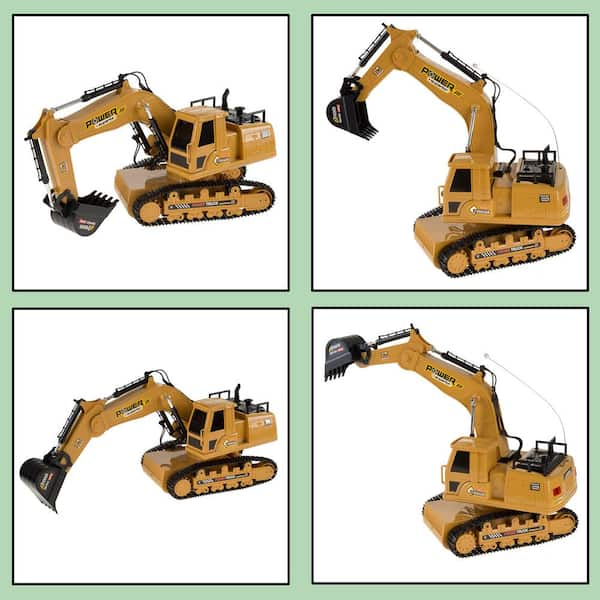All You Need to Know About the Double E Volvo rc excavator in Heavy Duty Excavation
Discover the Value of Excavator in Modern Building Projects
Excavators are crucial devices in modern building and construction projects. Their versatility allows them to perform a variety of jobs, from digging and grading to demolition and site preparation. Advanced functions, such as hydraulic attachments and general practitioners, improve their capacities and performance on work sites. As the sector develops, the relevance of excavators expands also extra. Comprehending their function can reveal understandings into the future of building and construction practices. What exists ahead for these equipments?
The Versatility of Excavators in Different Projects
Excavators are usually associated with large construction jobs, their flexibility allows them to be utilized in a vast variety of applications, from residential landscape design to energy upkeep. In urban settings, excavators can browse tight areas to dig structures for homes or install drainage systems. Their ability to do delicate tasks makes them ideal for landscaping jobs, where they can dig deep into for fish ponds or plant trees. Additionally, excavators play an important function in energy maintenance, efficiently digging trenches for pipes or cable televisions without disrupting surrounding locations. In agricultural applications, they assist in land cleaning and soil prep work. Their flexibility enables them to be equipped with various accessories, boosting their capability across different tasks. This multifaceted nature of excavators not only enhances various building procedures however also demonstrates their indispensable role in modern-day facilities advancement and upkeep.
Trick Attributes and Sorts Of Excavators
The conversation on essential functions and kinds of excavators highlights the essential features that make these equipments invaluable in building and construction. Numerous excavator types, each made for specific jobs, demonstrate their flexibility and performance throughout various applications. rc excavator. Comprehending these functions and classifications is important for enhancing their use in contemporary building projects
Excavator Enters Summary
Excavators play a pivotal duty in contemporary building and construction, supplying adaptability and efficiency throughout numerous jobs. These heavy machinery devices can be found in numerous types, each customized for certain applications. The most common types include crawler excavators, known for their security on unequal surface, and wheeled excavators, which offer higher wheelchair on paved surfaces. Mini excavators are favored for small jobs and limited spaces, while long-reach excavators are made for deep excavating. Additionally, there are specialized excavators, such as hydraulic excavators, which improve power and precision. Each kind features special abilities, making them important for jobs ranging from excavating and grading to demolition and product handling. Recognizing these variants permits construction experts to select the ideal excavator for their job requires.
Secret Features Explained
Comprehending the key attributes of excavators improves their reliable application in building and construction tasks. Excavators are defined by their powerful hydraulic systems, which give the needed force for excavating, lifting, and moving materials. Their expressed arms permit a large range of activity, facilitating specific operations in constrained areas. Additionally, the range of attachments, such as buckets, grapples, and augers, broadens their versatility to fulfill different task requirements. The size and weight of excavators likewise add to their security and maneuverability on different surfaces. Advancements in innovation have led to the combination of General practitioner and automation, improving precision and effectiveness in excavation jobs. These functions jointly place excavators as important devices in contemporary building and construction.
Applications in Construction
Changing building websites, excavators play an essential duty across numerous applications, ranging from household building projects to large facilities advancements. These versatile makers are equipped for tasks such as digging foundations, trenching for utilities, and site grading. Various kinds of excavators, consisting of spider, rolled, and mini excavators, provide specific benefits tailored to the job requirements. Spider excavators master harsh surfaces, while wheeled excavators supply mobility on smooth surface areas. Mini excavators are suitable for constrained areas, making them prominent in city settings. The efficiency and power of excavators considerably speed up construction processes, guaranteeing prompt job completion. Their adaptability even more improves their value, allowing construction groups to tackle a varied selection of difficulties successfully.
Enhancing Efficiency and Productivity on Work Sites
Making best use of performance and efficiency on work websites is an essential objective in modern-day building and construction. Excavators play a crucial function in achieving this objective by improving various tasks. Their capacity to do multiple features-- such as digging, training, and grading-- lowers the requirement for extra equipment, therefore conserving time and resources.Moreover, excavators enhance process by enabling faster conclusion of projects. With innovative attributes like hydraulic add-ons and general practitioners innovation, they can carry out accurate procedures that decrease mistakes and rework. This precision not just boosts the high quality of work however also optimizes material use, adding to cost savings.The convenience of excavators enables them to adjust to various site problems, making sure that tasks progress smoothly no matter challenges. By incorporating excavators right into building and construction procedures, groups can significantly increase their overall efficiency, resulting in timely job conclusion and raised earnings.
Safety And Security Benefits of Making Use Of Excavators
Excavators significantly improve safety and security on construction sites through enhanced operator presence and reduced hand-operated labor dangers. By providing operators with a clear view of their environments, excavators help to avoid crashes and injuries. Additionally, the equipment reduces the need for employees to participate in dangerous hands-on tasks, better advertising a more secure workplace.
Improved Driver Exposure
Although building and construction websites can be chaotic and loaded with prospective hazards, improved driver visibility plays a crucial function in ensuring safety and security when making use of excavators. Modern excavators are designed with big, unhampered windows and strategically put mirrors, enabling drivers to keep a clear sight of their surroundings (rc excavator). This improved visibility is vital for spotting pedestrians, various other equipment, and different challenges, substantially lowering the threat of mishaps. In addition, several excavators include sophisticated modern technology, such as sensors and cams, to provide operators with added point of views, further improving awareness. The capacity to see more plainly not only help in efficient procedure but additionally fosters a more secure work setting, making it much easier for operators to browse complex construction sites without compromising security criteria
Decreased Handbook Labor Dangers
When hand-operated labor is reduced through the usage of excavators, various safety and security benefits arise, significantly boosting the health great post to read of construction workers. Excavators lessen the physical pressure connected with heavy training and recurring jobs, effectively decreasing the danger of bone and joint injuries. By automating procedures such as excavating, grading, and moving materials, they permit workers to maintain a safer distance from prospective dangers. In addition, excavators are geared up with innovative security features, such as rollover defense systems and enhanced driver comfort designs, which even more secure workers on site. The result is a substantial reduction in workplace crashes and injuries, bring about increased productivity and morale among construction groups. Eventually, the fostering of excavators adds to a much safer and much more efficient building and construction setting.
Excavators in Earthmoving and Website Prep Work
In contemporary construction, a considerable part of earthmoving and website prep work tasks relies upon the effectiveness and adaptability of excavators. These makers are developed to deal with different dirt types and surface, making them important for rating, digging, and trenching activities. Their hydraulic arms can be equipped with different add-ons, such as pails and augers, allowing drivers to customize their approach based upon particular project requirements.Excavators succeed at relocating big quantities of planet promptly and effectively, which speeds up the total building and construction timeline. They can navigate limited areas and testing websites where traditional tools may have a hard time, improving productivity. In addition, the accuracy of excavators guarantees that site prep work sticks to More Help rigorous requirements, reducing the risk of errors that might lead to pricey rework.
The Role of Excavators in Demolition Tasks
Excavators play a vital role in demolition tasks, as they have the power and dexterity needed to dismantle structures efficiently. Furnished with various accessories such as hydraulic breakers, shears, and grapples, these machines can adapt to different demolition needs, whether for tiny buildings or huge commercial websites. Their versatility allows drivers to take on complex jobs while preserving safety and security and precision.In enhancement to their demolition capacities, excavators facilitate debris removal, making certain that work websites continue to be secure and organized. By breaking down structures into workable pieces, they enable structured clearing up and recycling of products, lining up with contemporary sustainability efforts.Moreover, excavators can access tight spaces and navigate unequal surface, making them indispensable in urban demolition tasks. Overall, their durable design and multifunctionality make excavators a vital property in the demolition phase of building, contributing significantly to task timelines and performance.


Future Patterns in Excavator Modern Technology and Usage
As the building and construction industry develops, advancements in excavator modern technology are positioned to change their usage and effectiveness noticeably. One substantial fad is the assimilation of automation and expert system, enabling excavators to operate with very little human intervention. This change will certainly enhance accuracy in tasks such as grading and trenching, reducing human mistake and enhancing productivity.Additionally, the increase of electrical and hybrid excavators is shaping an extra sustainable building and construction atmosphere, decreasing carbon discharges and fuel prices. Boosted telematics systems are additionally emerging, allowing real-time surveillance of equipment performance and upkeep needs, which can bring about much better functional efficiency and longer equipment lifespan.Moreover, innovations in attachment innovation are expanding the versatility of excavators, permitting them to do a wider variety of tasks. The combination of these fads demonstrates a future where excavators are smarter, greener, and extra adaptable, inevitably reshaping construction project characteristics.
Frequently Asked Inquiries
Exactly How Do Excavators Compare to Various Other Construction Equipment?
Excavators, identified by their convenience and power, excel in digging and earthmoving compared to various other machinery. Their ability to do various tasks, including lifting and demolition, makes them vital in building jobs, enhancing total performance.

What Is the Typical Life Expectancy of an Excavator?
The ordinary life-span of an excavator normally ranges from 7,000 to 10,000 operating hours, depending on maintenance, use problems, and design. Correct care can expand this life expectancy, making sure peak efficiency throughout its functional years.
Exactly How Are Excavators Preserved for Optimum Performance?
Excavators need routine upkeep for peak performance, including regular inspections, liquid checks, filter replacements, and prompt fixings. Executing a precautionary maintenance routine aids prolong their lifespan and guarantees efficient procedure in different construction environments.
What Are the Expenses Connected With Acquiring an excavator vs. renting?
The prices related to buying an excavator versus renting out vary considerably. Renting offers lower upfront expenditures yet can gather gradually, while buying needs a significant preliminary investment, yet offers long-term cost savings and property ownership advantages.
What Training Is Required to Operate an Excavator?
Running an excavator calls for specialized training, generally consisting of safety and security methods, equipment procedure strategies, and ecological recognition. Accreditation programs often mandate practical experience, making it possible for operators click now to deal with numerous tasks efficiently while making sure conformity with market guidelines. The most usual kinds consist of crawler excavators, understood for their stability on irregular terrain, and rolled excavators, which supply higher mobility on paved surface areas. Small excavators are favored for limited areas and small-scale projects, while long-reach excavators are made for deep digging. In addition, there are specialized excavators, such as hydraulic excavators, which improve power and accuracy. Different types of excavators, consisting of crawler, wheeled, and mini excavators, give particular benefits tailored to the job demands. Crawler excavators excel in harsh terrains, while wheeled excavators use flexibility on paved surfaces.